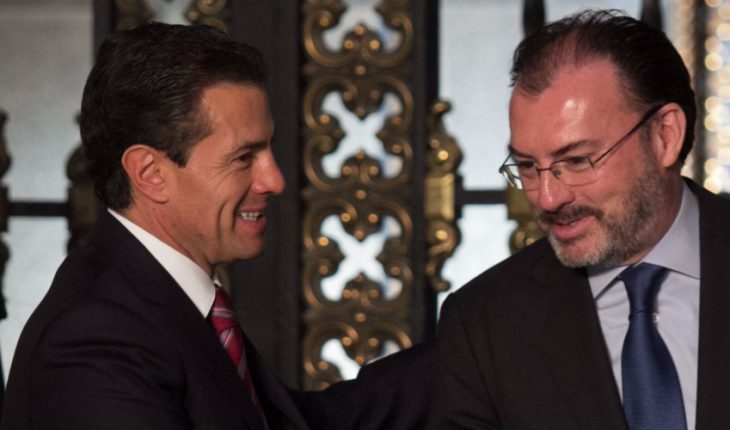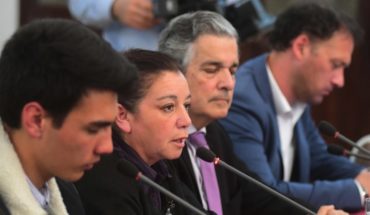For the first time, the Attorney General’s Office of the Republic (FGR) appointed former President Enrique Peña Nieto and former Secretary of finance, Luis Videgaray, to have participated in an alleged criminal plot aimed at bribing lawmakers with resources transferred by construction company Odebrecht.
The pointing was made by the FGR’s team of prosecutors at the court hearing in which former PAN speaker Jorge Luis Lavalle was accused of being one of the legislators who received these bribes in order to drive legal initiatives such as energy reform.
The investigations of the Prosecutor’s Office that resulted in this first complaint began from the complaint filed in August last year by the former director of Pemex, Emilio Lozoya, who is also involved in the alleged corruption plot.
Read: Judge orders pre-trial detention against former Lavalle healer for Odebrecht case
According to ministerial authorities consulted by Political Animal, FGR prosecutors Kristian Jiménez Hernández, María Luisa Zúñiga, Jaime Arellano and Manuel Granados detailed before the federal judge, Marco Antonio Fuerte Tapia, the operation in the past six years of an alleged “criminal association” between federal officials and legislators.
The criminal association would involve, as the prosecutors explained to the judge, from former President Peña Nieto and former Secretary Videgaray, to former members of the 62nd Legislature: Jorge Luis Lavalle Maury, Francisco García Cabeza de Vaca, Francisco Domínguez Servién and Salvador Vega Casillas.
Following Lozoya’s complaint, prosecutors indicated that construction company Odebrecht (involved in multiple corruption cases on the continent) would have channeled nearly 120 million pesos into bribes to Peña Nieto’s government, in order to continue to be favored under various contracts. This between 2013 and 2014.
Peña and Videgaray would have ordered that some of that money be distributed to various legislators to “pave” the way for structural reforms that were being slothered like energy. Lozoya Austin acknowledges that he was responsible for having operated – on the instructions of those officials – the logistics of those payments.
Find out: Panista confesses how Pemex bribes were given; exsenador denies his version
Prosecutors argued before the judge that as a result of the complaint filed they have gathered sufficient evidence (such as videos, documents and receipts) that would confirm that this criminal association existed for the purpose already mentioned. Among these data would be, for example, the ministerial statement by Rafael Caraveo Opengo, former Senate official, in which he refers to receiving and delivering suitcases with millions of pesos in cash.
Lavalle Maury is, until now, the first judicially charged for this crime and imprisoned by it. The rest of those involved in the aforementioned “criminal association” plot are in the form of investigated. According to the FGR, the allegations against more people will continue in the coming weeks and months.
Article 164 of the Federal Criminal Code defines the criminal association as a “band of three or more persons for the purpose of delinquension”. The penalty for those responsible ranges from 5 to 10 years in prison.
Why wash and bribe?
At the initial hearing, FGR prosecutors also accused former lavalle of being presumed responsible for crimes in operations with resources of illicit origin, colloquially called money laundering, as well as the crime of bribery.
In the case of bribery, a crime committed by public servants in receiving or unlawfully requesting resources to do or stop doing something, prosecutors argued that Lavalle committed it by having agreed to push for energy reform in exchange for alleged bribes,
With regard to money laundering, which involves receiving money of illicit origin, prosecutors indicated that the former baker would have committed this crime when he allegedly received the money sent by Lozoya.
The Federal Criminal Code states that the penalty for the crime of bribery goes from two to 14 years in prison. The crime of money laundering reaches a sentence of five to 15 years in prison.
What’s next for Lavalle? Possible jail for several months
Next Monday at ten o’clock in the morning, the initial hearing against former healer Lavalle Maury will resume before federal judge Marco Antonio Tapia. ECenter for Federal Criminal Justice located in the North Preventive Reclusory.
The session will begin with the presentation of the data, evidence and arguments that your defense offers to call into call into consideration the initial imputation made by the Public Prosecutor’s Office. Then comes the prosecutors’ response, a debate and finally the judge’s decision on whether or not to link the panista to the process.
In the event that he is linked to the process, it is very likely that Lavalle Maury should remain imprisoned while the whole process is taking place, since the same judge who will decide his legal situation has already considered that this is a justified measure at the risk of his escape.
It should be noted that, although the hearing will be restarted on Monday, the deadline for the judge to resolve Lavalle’s situation expires until Wednesday, so the determination could be extended to that date.
And for Lozoya? Process stopped
Emilio Lozoya was the first Mexican official prosecuted for bribes by construction company Odebrecht. So far, however, he has not been imprisoned because he offered to work with the FGR to reveal the real dimension of the alleged corruption scheme in which he participated.
More than eight months have passed since Pemex’s former director was linked to the process at the end of July 2020 for the same crimes for which Lavalle is now accused. Your case is being held in the supplementary investigation phase.
The reason, as federal authorities at the time revealed to this medium, is that the FGR is considering asking the judge to temporarily stay the case against Lozoya as a result of an opportunity criterion that would be given to him for the collaboration he has provided. The final cancellation of your process would be subject to successful cases initiated as of your complaint.
After several delays, the intermediate hearings against Lozoya were scheduled for 15 and 16 April for the Odebrecht and Agronitrogenados cases; however, they are expected to be suspended or postponed again because of ongoing negotiations and agreements.
What we do at Animal Politics requires professional journalists, teamwork, dialogue with readers and something very important: independence. You can help us keep going. Be part of the team.
Subscribe to Animal Politics, receive benefits and support free journalism.#YoSoyAnimal





